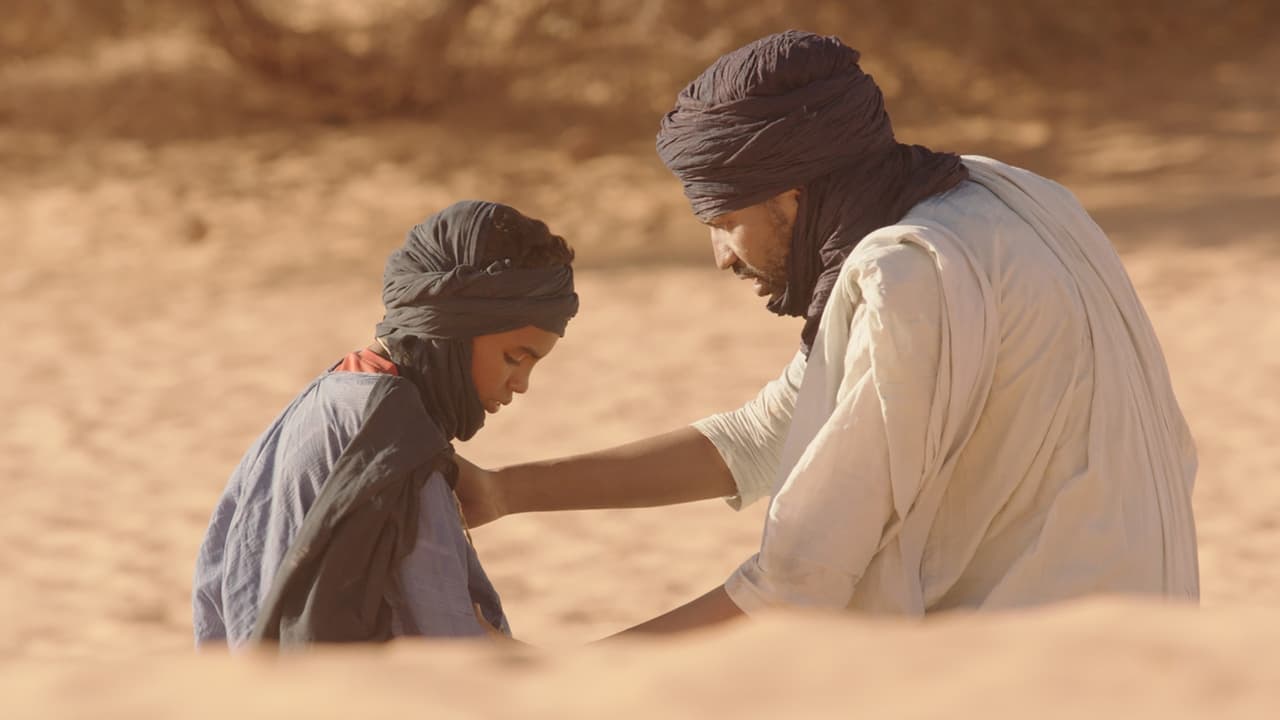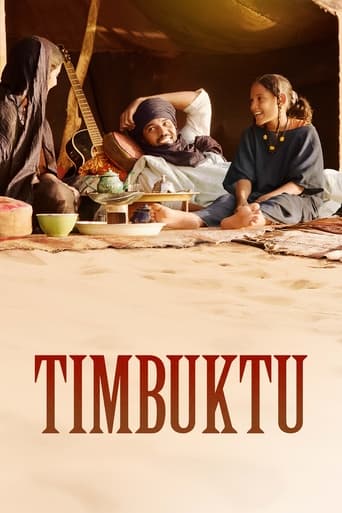



Very well executed
The movie's not perfect, but it sticks the landing of its message. It was engaging - thrilling at times - and I personally thought it was a great time.
View MoreEach character in this movie — down to the smallest one — is an individual rather than a type, prone to spontaneous changes of mood and sometimes amusing outbursts of pettiness or ill humor.
View MoreThe plot isn't so bad, but the pace of storytelling is too slow which makes people bored. Certain moments are so obvious and unnecessary for the main plot. I would've fast-forwarded those moments if it was an online streaming. The ending looks like implying a sequel, not sure if this movie will get one
View MoreIn the opening scene of "Timbuktu", a jeep carrying armed men is seen chasing a gazelle across the pristine dessert. This scene is followed by another scene showing militants of the so-called Islamic State shooting at intricate masks and dolls that are undoubtedly cultural icons from the region. "Timbuktu" is a remarkable film for a number of reasons. The timing of the film was so necessary because in the same year that the film came out a self-proclaimed caliphate swept up large swaths of territory across the Muslim world extending its cruel grip even to Africa. The beautiful scenes of the dessert around Timbuktu are accompanied by a masterfully selected soundtrack of tunes from the region. The music is relentless and melancholic, just like the dessert. Both stand as immobile presences throughout the film. In one odd scene, a group of men are arguing Messi and soccer. The audience is purposefully misled into thinking the discussion was about a serious war or series of battles. But the truth is, most boys would rather fight about soccer than something as obscure as religion. Another poetic scene happens during the film when a man is sentenced to 20 lashes for knowing that football is forbidden and still choosing to play. In the next scene, a group of young boys are all playing football, without a ball. The ball is forbidden. The boys in the colorful shirts and shorts end up running around an empty field kicking sand at each other. How can you forbid children from playing? The boys cheer an imaginary goal before they feel the need to stop and hide their activities from a motorcycle patrol. In another instance, a group of fighters are sent to find where music is coming from. When they realize the music is religious in nature and praises Allah and Muhammad they question the need to stop it. More people start to play music as a form of protest. A clearly non- silent protest that can be visibly heard by ISIS patrols in the city at night. A woman sings, "This is my land and this is my Timbuktu. It's children are mourning and suffering. It's the land of love and warmth and dignity. So tell me, why are the children crying? Because of the injustice, violence, and fear of the future. Stop crying, my Timbuktu will always be here. Everything will go fast. You've got little time left". Later in the film, the woman who's beautiful voice carries across the Timbuktu dessert is sentenced to 40 lashes for singing. Another 40 lashes are sentenced for meeting with men in private without her parent's permission. As she kneels and begins to be whipped she continues to sing. It is a poetic protest in response to the so-called Islamic States' cruel and unjust punishment system. An Imam questions the so-called Islamic State's cruelty towards women by scolding, "Remember the words of Allah Almighty. Forgive them. Involve them in decisions. Talk with them. Once you have decided, I put your trust in Allah. Because he loves those who trust him. Where is the mercy? Where is the forgiveness? Where is the piety? Where is the change, the change? Where is god in all this?".The greatest aspect of Timbuktu is the fact that the film doesn't glorify war or violence in the fashion that Hollywood so regularly chooses to. In fact the main struggle of the film is quite simple. Nearby Timbuktu, a territorial fight brews between a fisherman and a cowherd. This struggle is less of an ideological struggle and more of a struggle for survival. A boy loses track of the cowherd's youngest cow which strays into the fisherman's nets. The fisherman kills the cow and in a poignant scene the cow can be heard breathing long after it appears to be dead. The dramatic effect is undeniable. Like Africa, the injured calf will continue to fight for life long after it was left for dead. The cowherd confronts the fisherman and in the ensuing fight a gunshot abruptly interrupts the scene and both characters are seen floating in the water. One of them gets up. The other doesn't. The calm tranquility of the setting stands in contrast to the dark nature of the political situation. The so-called Islamic State confiscated all of the cowherd's cows and property for his alleged murder of the fisherman. The cowherd shows no regret or fear in response to being sentenced to death by the fake caliphate. Before accepting his fate, the cowherd asks the so-called Islamic State commander if he has children. When the commander replies in the affirmative, the cowherd makes one final plea for his daughter and the children of Africa. He says, "What is written will be done. I am at peace with death. We are all his children. We must protect our children. My daughter will not be protected. That hurts my whole being. Down in the grave without knowing what will happen to her. Most of our relatives have already left. But in all this, since there is only one God, I worship, he will make justice. No one escapes his fate. Tell him that it's not death that scares me but not being able to look back".
View MoreTimbuktu is an intricate movie. It shows the conflicting problems occurring in Mali, and that being the control of the extremists. This movie presents a very accurate amount of detail on the treatment of women in Mali, but that's also happening in other countries as well.In this film, many women and men were not able to do activities that are common in the daily lives of others living in America and Europe, like singing, or playing soccer. I liked the way that this film showed how the character's lives were being affected daily in their lives. Many were forbidden to do things that are said not to be written on any written document, and were set up by the extremists to control the people. My favorite scene like many others who have seen this film would be when the young boys were pretending to play soccer without an actual ball, because it was forbidden by the extremist laws. This shows that many who live in Mali, and other countries that are controlled by extremists wish to do activities that they know if they are caught doing, will put their lives in danger. Overall I thought this movie was very good, but the only thing I would change would be the ending. The ending of the film was very weird to me it showed Toya one of the main characters in this film, and her brother both running in a direction which seemed like never ending, and then the film ends. I would give this film a 4/5 stars.
View MoreFor starters, I'm not too big a fan of slow, rather speechless films like this one. At the same time though, it still had me captivated like the other ones and for the same reason as well. It's very interesting to me seeing what life is like in countries I never really hear or care about. Also seeing the way Islamic militant groups are outside of the battlefield was a cool thing to experience. The movie also showed how everyday people live under their governmental control. I found a lot of the rules they imposed and the punishments for breaking those rules to be quite extreme. A woman was given 80 lashes for singing in her home. Something I found strange about this system was that there was a set amount of lashes for sinning, but then you were given more lashes if you confessed to doing that sin. I also just don't see what's bad about singing in your own home, or just having a good time playing soccer. That's another thing. Soccer was seen as a sin for some reason and then the kids started playing without a ball and it seemed like it didn't matter, so is soccer the sin, or is playing with balls a sin?
View MorePowerful, evocative & thoroughly engrossing, Timbuktu is a riveting portrait of life under regime of terror that brilliantly illustrates the absurdity of extremist mentality in a sardonic manner while also showcasing the hypocrisy of the Jihadists who themselves are unable to live up to the rules they so blatantly like to impose on the general population.Timbuktu covers everyday life in the titular city of Mali which is under the occupation of Islamists & covers the harsh life its residents are forced to live for all leisurely activities are forbidden. The plot centres on a cattle herder & his family who live on the outskirts of the city & are typically free from those terrorists' interference but an unexpected incident abruptly changes their fate.Co-written & directed by Abderrahmane Sissako, Timbuktu tackles a provocative subject matter in a very serene manner by sidelining the barbaric brutality that's inflicted by terrorists upon civilians on a daily basis and instead focuses on the human condition within an oppressed regime. Sissako's direction exhibits terrific restraint but the script is unable to fill all the voids that exist in between.The desolate locations & deserted set pieces evoke a grim environment with nearly no signs of life, camera is effectively utilised to capture all the unfolding drama in a clear, concise manner, Editing however is a mixed bag for the subsidiary scenes are more engaging than the basic plot, its 96 minutes of runtime feels overly stretched, and music makes its presence felt only when it is required.Coming to the performances, the entire cast does really well in bringing their characters to life with utmost sincerity & what further helps their act is that the people they play aren't mere caricatures, thanks to some sensible writing. Despite its grim tone, the graphic violence is kept at bay for the most part and where it leaves its mark is in moments that demonstrate the jihadists' oppressive tactics to control people's lives & faith.On an overall scale, Timbuktu is a patiently structured, beautifully layered & surprisingly unbiased observation of radicalism & its devastating effects on the lives it touches upon. Skilfully directed & smartly scripted, its arrival is undoubtedly timely but what's even more admirable is the fact that it dares to portray those zealots for what they are; humans, blinded by single-minded ideologies but humans nonetheless. Adding more grey shades to what appears black n white from afar, Timbuktu is worthy of a wider audience.
View More